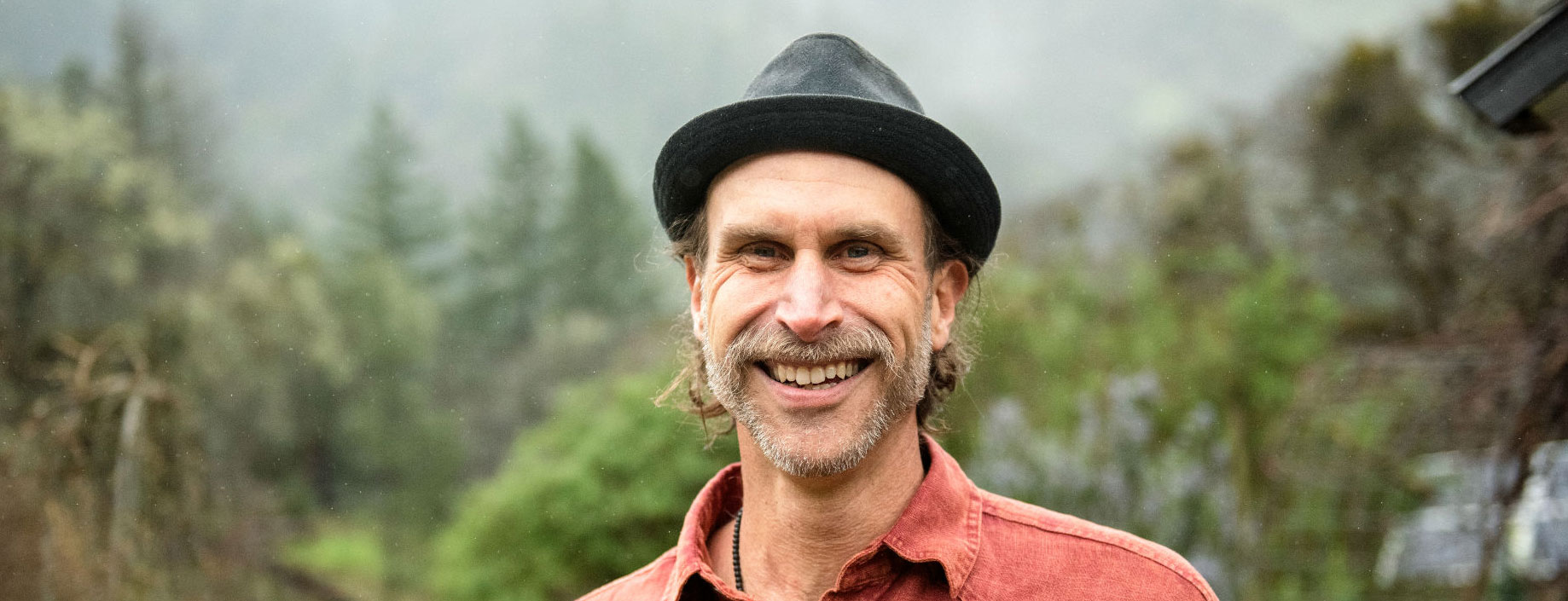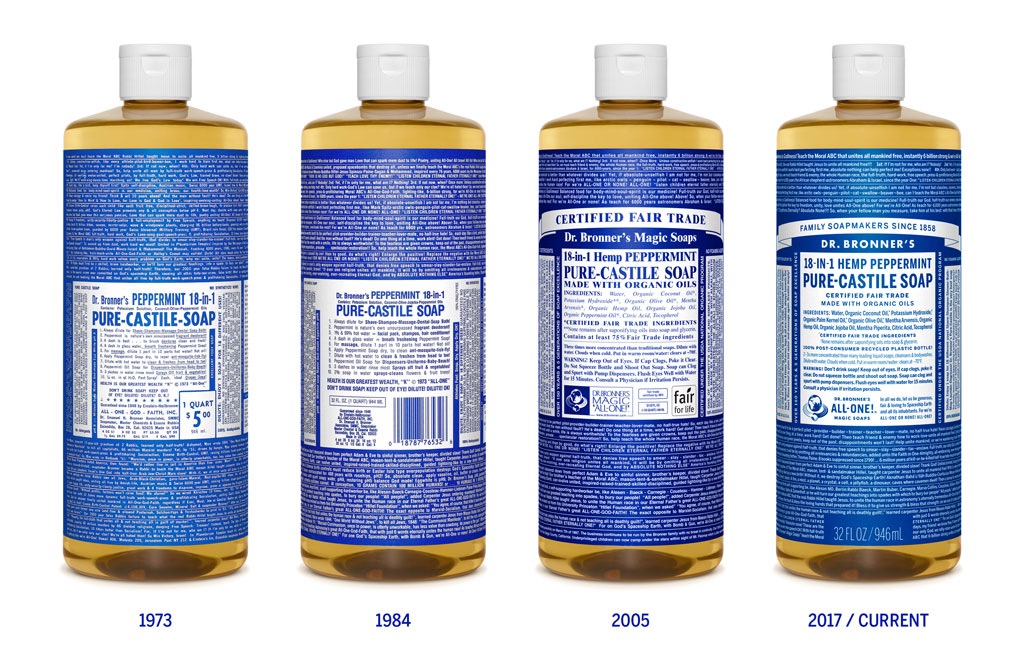
David bronner
Authenticity Armored by Action
Impact can take many forms. For some, it’s about providing support that empowers the base of the pyramid; for others, it can be about investing in earth-friendly solutions to mitigate or reverse climate change. It can even be as simple as creating a vehicle through which to deliver a message of unity and hope. For Dr. Bronner’s, the third-generation family-owned soapmaker, the company tackles each of these issues and several more. But their most pronounced impact is still in their message. It actually encapsulates the Dr. Bronner’s brand, conveying an authenticity that remains unmatched and is arguably more distinct in an era of greenwashing and highly polished ESG affirmations from Fortune 500 companies.
Most, at this point, are quite familiar with the Dr. Bronner’s brand. For the more absentminded shoppers, the company’s signature product is its 18-in-one Pure Castile Soap. It’s the one whose label contains over 2,600 words of text, mostly in fine print, to “teach friend and enemy the full-truth Moral ABC” and “unite all mankind free in One-God-Faith.”
Many, at this point, are also familiar with the story behind Dr. Bronner’s. Born into a Jewish-orthodox family, Emanuel Bronner was a third-generation master soapmaker. He immigrated to the U.S. from Germany in 1929, but lost both parents to the Holocaust when they were murdered in concentration camps. Emanuel, inspired to spread a message of transcendent unity, would deliver sermons in Los Angeles, where he would also sell the family’s organic soap. When he saw that people were coming for the suds and skipping the sermons altogether, he simply put his message on the label.
All of this has been covered before. While the world’s largest CPG brands spend tens of billions of dollars on advertising and marketing each year, Dr. Bronner’s attracts earned media – the kind you don’t have to pay for – like no other consumer brand in the world. The New York Times cites Dr. Bronner’s as the best solution to get the “vintage-store” smell off of thrift-store clothes. The Wall Street Journal, quoting a Levi Strauss & Co. executive, shared that the best way to care for jeans was to wash them once every six months using two tablespoons of Dr. Bronner’s, adding vinegar for darker jeans “to set the indigo.” And the LA Times, since the 1980s, has covered the family business in stories ranging from the most effective homemade cleaners to the philosophy and message of Emanuel Bronner.
This is the type of exposure that truly has to be “earned” regardless of how much money the world’s largest consumer companies pour into their marketing, PR or CSR budgets. It also underscores the power of a brand, when it’s credible, to deliver a message of social change, one that resonates with consumers and informs populations about pressing social issues that are in their capacity to help address.

The One Constant
The label has changed little over the past 50 years. More perceptive consumers might point out that in the 1970’s, it had a price, $5, somewhat prominently displayed in the white band of the label. This was replaced in the 1980’s with a bar code. In the 2000’s, beyond a short-lived experiment with serifs, the label gained a “certified fair-trade” banner, while hemp-oil was added to the list of ingredients. Today, the label celebrates the family lineage in soapmaking, going back to 1858, but returned to its “sans-serif” roots (perhaps by chance or perhaps to make the message more legible to consumers.) Emanuel’s message, either way, remains mostly untouched.
This is not to say the mission hasn’t evolved. David Bronner, for instance, notes that his granddad was driven by divine inspiration stemming from the murder of Emanuel’s parents in the holocaust. This trauma shaped his philosophy, the Moral ABC, that advances the idea of an All-One-God that will unite mankind across religious, ethnic and geographic boundaries.
The next generation, his parents, Jim and Trudy, as well as Jim’s brother Ralph, after helping the company emerge from bankruptcy, focused on implementing progressive employee practices. Long before Dodd-Frank put in place rules for public companies to disclose the relationship between executive compensation and the average worker pay, the second generation of Bronners imposed a salary cap limiting CEO pay to just 5x the lowest-paid employee. To put this in perspective, the CEO of Bath & Body Works makes 1,662x the median salary of the company’s workforce (and would be even higher if the ratio was measured against the lowest-paid staff members). But outside of the focus on employees, the second generation of Bronners also donated considerable sums to the Boys and Girls Club, even when doing so put the company at financial risk.
Today, David and his siblings continue to leverage the company’s reach to not only honor the message of previous generations, but build upon that foundation to tackle other important issues. One that’s directly aligned to the company’s sourcing practices, for instance, revolves around regenerative agriculture. Beyond building awareness around the importance of soil fertility (ie, the aforementioned documentary), the company works directly with its suppliers and their farmers educate them on the benefits of regenerative practices (higher yields, more resilient crops, etc.). As a customer, Dr. Bronner’s is also creating a market that will see these practices generate higher profits, while at the same time working within the industry to establish the Regenerative Organic Certified standard.
Rather than rent space on a billboard to spread the word, the company launched a new product, Dr. Bronner’s All-One Magic Chocolate Bar. It’s produced in Switzerland using ingredients, such as cocoa and palm oil, sourced only from farmers practicing regenerative organic agriculture. David Bronner notes that a related project, to preserve a regenerative ecosystem in Palestine, when combined with two other operations in Israel, provides 100% of the company’s olive oil. He adds that through these collaborations, in a small way, it’s a step to realize his granddad’s vision for peace and prosperity across cultures.
Another issue close to David’s heart is the company’s advocacy to end the war on drugs. As a boardmember of the Multidisciplinary Association for Psychedelic Studies (MAPS), he helps to fund clinical research into psychedelic therapy and builds awareness for policy reform. The research, for instance, explores the role and efficacy of psychedelics — from cannabis and LSD to MDMA an Ayahuasca — to treat a range disorders, including PTSD, social anxiety and addiction.
Again, authenticity is armored by action. Dr. Bronner’s was among the most vocal supporters to legalize hemp cultivation and, today, sources 100% of hemp seed oil from U.S. farmers. The company was also among the first in the U.S. to cover ketamine therapy in its employee healthcare program. And, for a limited time, it used its most valuable real estate available – the Dr. Bronner label for its 32 oz. soaps – to educate the public around the benefits of psychedelic medicine and help remove the stigma around these therapies.
The advocacy, beyond advancing an important cause, continues to provide a brand halo that creates a virtuous cycle for the Dr. Bronner’s brand and the message the company aims to convey. A recent New York Times story highlighting the company’s action around psychedelics attracted over 430 comments from readers – the majority of whom are loyal customers, celebrating the company’s activist efforts.
The generations may change; the message may evolve; but the one constant is the quality of the product.
“We spend as much on the essential oils as everything else that goes into a bottle of our soap,” David Bronner describes. “Organic coconut oil is the best ingredient you can find to lather and cleanse… A lot of our competitors, if they can manufacture and sell knockoffs using cheaper ingredients or chemicals, they’ll do that. But you’re not going to get that menthol blast without real essential oils.”
As passionate as David is about the product, he stresses, “We put our mission first.” He further equates that the soap – and the company’s entire product lineup for that matter – is akin to the cookies sold each year by the Girl Scouts. “We exist for progressive social change. It’s not ‘cause marketing’ or something we pursue on the side. We will always put our mission first.”
The quality of the products ensures it’s a well-funded mission. Equally important, the enthusiasm for the brand provides an enduring platform to reach new audiences and, over generations, take on new causes.